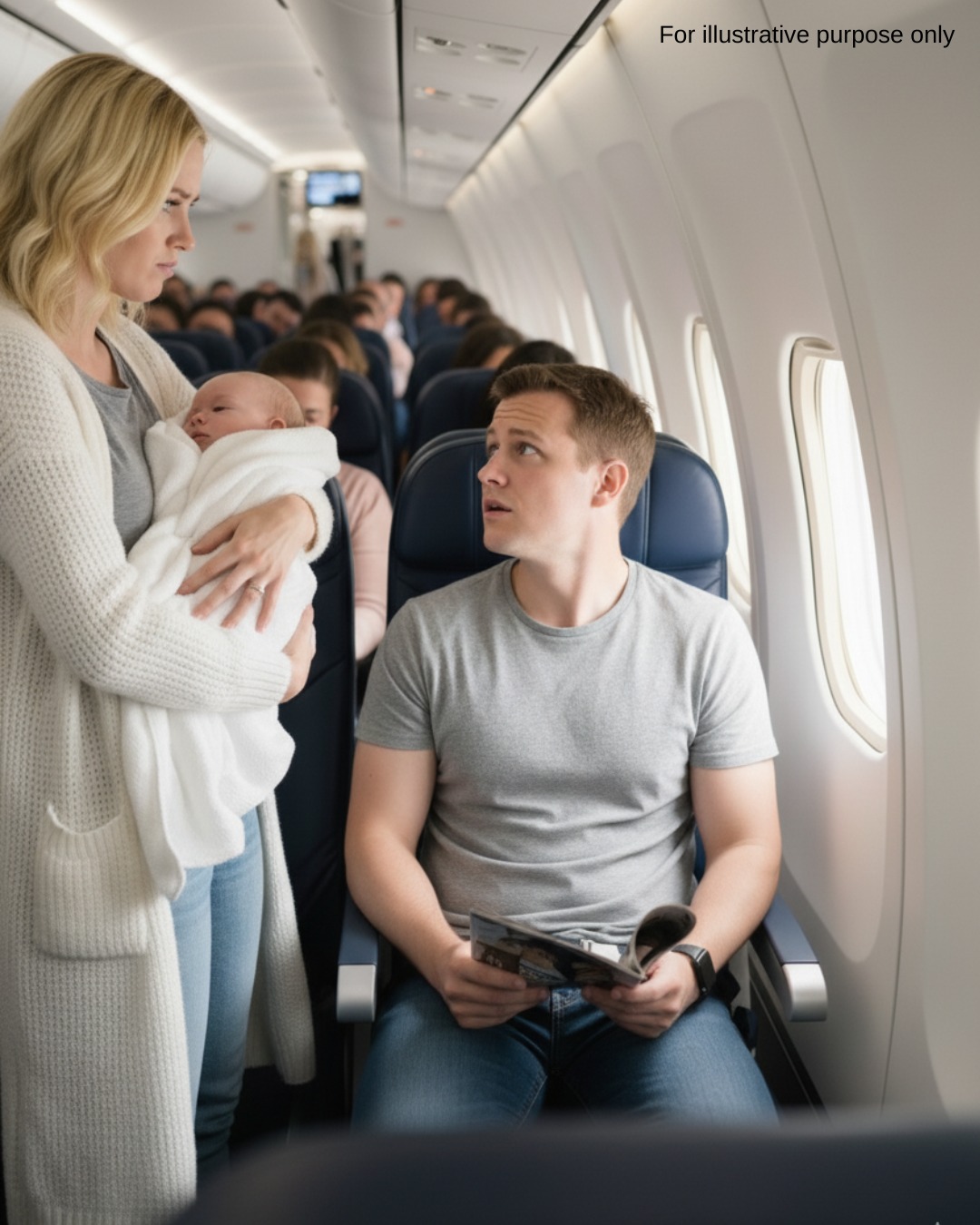David Miller had been anticipating this journey for weeks.
After countless late nights at the San Francisco office, a ten-hour flight to New York felt like a rare opportunity to disconnect, unwind, and finally enjoy the aisle seat he had deliberately chosen. Comfort was never left to chance—he had paid extra for a spot near the front, ensuring a quicker exit and fewer strangers brushing past on the way to the lavatory.
As he settled in, adjusting his noise-canceling headphones, David thought the hardest choice he’d face would be whether to finish the in-flight movie before drifting off. That assumption vanished the instant a woman appeared beside him, holding a baby, her face drawn with fatigue yet filled with anticipation.
“Excuse me,” she said, her tone sharper than polite. “Could you swap seats with me? I’m stuck in the last row—middle seat.”
David lifted his headphones, blinking in surprise. “I’m sorry, but I paid extra for this one. It’s a long flight.”
Her jaw tightened. “I have a baby,” she pressed. “It would really help us.”
He hesitated for a moment, aware of the curious glances around them. But he stood firm. Calmly, he replied, “I can’t, sorry.”
The woman let out a dramatic sigh and, raising her voice so everyone could hear, muttered, “Wow, no heart.”
The accusation rippled through the cabin. Passengers turned to watch—some disapproving, others intrigued. David’s pulse quickened slightly, yet his expression remained composed. He wasn’t about to engage in an argument.
Instead, he caught the flight attendant’s eye. “Could you arrange for security to meet us at the gate?” he said evenly. “I’d like this documented.”
The woman’s face drained of color. Whispers spread through the rows. By the time the plane landed and officers boarded, the woman finally seemed to grasp the consequences of her public theatrics.
David was well-versed in air travel. His work as a corporate project manager frequently sent him across the country for meetings and negotiations. Over time, he had developed a system: early check-in, paid aisle or front-row seats, noise-canceling headphones, and never relying on luck.
That discipline stemmed from experience. A year earlier, he had given up his seat to a couple wanting to sit together. They had promised an equally good replacement, yet he ended up crammed in the back beside a malfunctioning lavatory. The flight was miserable. From that day on, he vowed never to surrender his seat again.
So when the woman asked, it wasn’t cruelty—it was clarity. He didn’t resent her for asking; he simply knew he wasn’t obliged to comply.
Yet after her outburst, tension lingered. He caught snippets of whispered comments: “She has a baby,” someone muttered behind him. Another passenger shook their head in disapproval. David remained still, hands folded, breathing deliberately. Years of negotiating high-stakes corporate deals had taught him that calm silence could assert more authority than words.
The flight attendant soon crouched beside the woman. “Ma’am, we can’t force anyone to change seats. I can ask if someone volunteers, though.”
The woman scowled at David, her baby fussing in her arms. “Forget it,” she snapped, marching toward the back.
The rest of the flight carried on under a quiet tension. Some passengers shot him icy stares, while others offered small nods of approval—those who understood the unwritten rule: never surrender a paid seat, particularly on a long-haul journey.
When the plane touched down, David again requested law enforcement to meet the aircraft. “I’d like the situation documented,” he said.
The cabin fell silent as officers boarded. The woman’s earlier confidence dissolved, replaced by discomfort. For the first time, she seemed to realize the error of her approach.
David said nothing. No smirk, no gloating. He simply retrieved his carry-on and exited, confident he had upheld his position without losing composure.
Later that evening, sitting in his New York hotel room, he reflected on the incident. It was no longer about the seat—it was about principle.
All his life, people had suggested that kindness meant sacrificing yourself—that saying “no” was selfish. He had learned differently. Boundaries weren’t cruelty—they were necessary.
The woman hadn’t simply requested a seat change; she had tried to manipulate him with guilt. That was the real issue. Had she accepted his refusal, the flight would have remained uneventful. Instead, she weaponized sympathy.
Her words—“no heart”—echoed in his mind. Irony struck him: having a heart didn’t mean letting others override your choices; it meant acting with fairness and integrity, which he had done.
He also recognized the double standard at play. A lone businessman refusing a mother’s request could easily be seen as callous. Exhaustion and entitlement, however, were not synonymous, even when accompanied by a child.
Later that week, during dinner with colleagues, he recounted the story. Hesitant at first, he explained the premium seat, the previous miserable experience, and the public accusation. They nodded in understanding. One even chuckled, “I’d have done the same.”
That validation mattered. It wasn’t a triumph—it was reassurance.
The incident reinforced a truth David had long understood: strength isn’t about overpowering others, but about remaining composed under challenge. The flight had tested his patience, judgment, and integrity—and he had passed.
Packing for his return trip, David smiled faintly. There would always be more flights, more requests, more boundary tests. But now he knew: having a heart wasn’t measured by what you give away—it was measured by how firmly and respectfully you stood your ground.
On that flight, he hadn’t been heartless. He had simply chosen self-respect—and that was more than enough.
